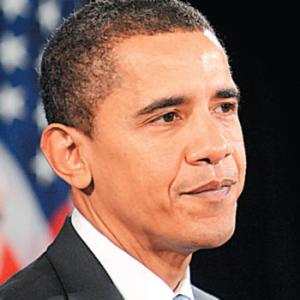3RD ROUNDUP: Obama to end US combat role in Iraq by August 2010
 Washington - US President Barack Obama announced Friday that he will withdraw most US combat troops from Iraq by the end of August 2010, sharply reducing the American presence but keeping in place thousands of soldiers to support and train Iraqi forces.
Washington - US President Barack Obama announced Friday that he will withdraw most US combat troops from Iraq by the end of August 2010, sharply reducing the American presence but keeping in place thousands of soldiers to support and train Iraqi forces.
There are presently more than 140,000 US troops in Iraq. Obama plans to keep about 35,000 to 50,000 soldiers to help train and equip the Iraqis and participate in special counterterrorism missions. The pace of the withdrawal will be determined by the commanders on the ground.
"Let me say this as plainly as I can: By August 31, 2010, our combat mission in Iraq will end," Obama said at Camp Lejeune, a Marine base in North Carolina. Obama's timeframe for ending the combat role is three months later than he pledged during the election campaign.
All US forces must leave Iraq by the end of 2011 under the security agreement worked out by the Bush administration last year with Iraqi Prime Minister Nuri al-Maliki. Obama said he intends to stand by that agreement and called on the Iraqi people to take control of their country.
"America's men and women in uniform, so many of you, have fought block by block, province by province, year after year, to give the Iraqis this chance to choose a better future," Obama said. "Now, we must ask the Iraqi people to seize it."
The security agreement also requires US combat troops to pull out of all Iraqi cities by June.
Obama said the United States will remain diplomatically and economically committed to Iraq as the military role shrinks, but also warned that the situation remains fragile despite the sharp reduction in violence that took place under former president George W Bush's troop surge.
"Let there be no doubt: Iraq is not yet secure, and there will be difficult days ahead," Obama said. "Violence will continue to be a part of life in Iraq."
Reducing the US role in Iraq and shifting focus to conflicts in Afghanistan and Pakistan has become the top military priority for Obama. A resurgent Taliban has stepped up attacks in Afghanistan, bringing violence to the highest level in years as US and NATO forces struggle to stabilize the country.
"We have also taken into account the simple reality that America can no longer afford to see Iraq in isolation from other priorities: We face the challenge of refocusing on Afghanistan and Pakistan," Obama said.
Obama has launched a comprehensive review of the two military conflicts and reached his decision after consulting with his top officers, including General David Petraeus, the commander of US forces in the Middle East, and General Ray Odierno, the top officer in Iraq.
Defence Secretary Robert Gates told reporters on a conference call after the speech that Obama weighed the risks involved in setting a timeframe for a pullout against the need for more troops in Afghanistan and the stress that already exists on the US military.
"The date provides a way of delineating when one mission in Iraq ends and a completely new and different one begins," Gates said. "It's important for our troops to know. It's important for the Iraqis to know."
Republican lawmakers were quick to criticize Obama's decision, warning that the "arbitrary" timeframe could jeopardize the progress that has been made.
"It would be unacceptable to see that progress lost because of a political promise made on the campaign trail rather than a well planned out withdrawal done based on continuing recommendations by commanders on the ground," Senator James Inhofe of Oklahoma said.
Obama met Democratic and Republican lawmakers at the White House Wednesday night to present the plan. Republican Senator John McCain, Obama's opponent during the campaign who ridiculed the Democrat's proposal for pullout dates, said the White House's timeframe was "not without risk" but was "reasonable."
"I am cautiously optimistic that the plan as laid out by the president can lead to success," McCain said in a statement.
Since the March 2003 invasion of Iraq, 4,253 American soldiers have died, according to the Pentagon. Obama said the war has cost the United States nearly one trillion dollars.
Obama presented his 2010 budget on Thursday, which includes 205.5 billion dollars for the wars in Iraq and Afghanistan - with 75.5 billion for the rest of this year and 130 billion for the 2010 fiscal year, which begins October 1.
Obama also announced that veteran diplomat Christopher Hill has been tapped as the next ambassador to Baghdad, replacing Ryan Crocker. Hill served as the lead negotiator with North Korea during the Bush administration.
Scaling back the US role in Iraq will enable the United States to broaden its engagement throughout the region to push for Israeli- Palestinian peace, go after al-Qaeda in Afghanistan and Pakistan, and use "all elements" of American power to prevent Iran from obtaining a nuclear weapon.
"Every nation and every group must know - whether you wish America good or ill - that the end of the war in Iraq will enable a new era of American leadership and engagement in the Middle East," Obama said. "And that era has just begun." (dpa)